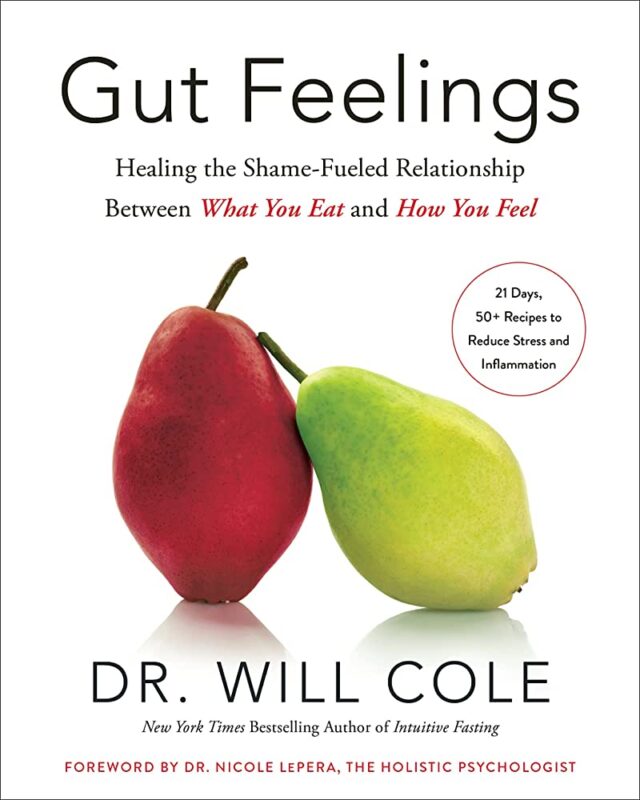 By Dr. Will Cole
By Dr. Will Cole
Throughout my years of treating patients and helping them get their bodies and minds back to vibrant health, I’ve seen the way that negative thoughts and emotions can subtly and systematically sabotage health, in much the same way as inflammation can. In fact, I see this phenomenon of emotional suffering causing physical suffering so often that I decided to give it its own name: shameflammation.
Shameflammation is present in every single one of us to some degree, and it can make us feel overwhelmed, anxious, hopeless, aimless and totally disconnected from our intuition. It can be both the underlying cause and result of chronic health conditions—it’s often the one thing standing between us and optimal health. Shameflammation can make us feel like we’re constantly swimming upstream and at war with our bodies. Thoughts and emotions are like nutrients for your head, heart and soul; unfortunately, many of us have been feeding ourselves junk food for a long, long time.
Over the years, I’ve learned that shame is perhaps the strongest, most damaging negative emotion of all. Brené Brown, a renowned shame and vulnerability researcher, says that “shame is lethal” and explains that shame affects all of us and profoundly shapes the way we interact in the world. And then, there’s the other half of the word shameflammation, the part that includes inflammation. Inflammation is actually a lifesaving biological process that was expertly created to help protect you from harm. But this is true only when inflammation is acting the way it was designed to work. And for many of us, this is unfortunately not the case. Instead, many of us deal with chronic inflammation. This chronic inflammation is caused by a whole list of factors such as toxins in our environment, too much sugar in our diet and a sedentary lifestyle. Chronic inflammation can also be triggered by stress, shame and difficult emotional experiences. And when shame-triggered inflammation is high over a long period of time, it can contribute to disease.
Stress, shame, inflammation, shameflammation—it’s all inevitable to some degree. But our relationship with ourselves in the present moment contributes to whether the challenges we face flood our body with inflammation or are met with calming balance, allowing our body to thrive. This is why so much of taming shameflammation has to do with self-compassion. Self-compassion and a sense of being your biggest cheerleader should always be the underlying cause of anything you do for your health and wellness. Why? You can’t heal a body you hate.
The bottom line is that shame is ever-present in our lives and ever-relevant when it comes to our relationship with ourselves and our health. When I’m consulting with my patients from my functional medicine telehealth clinic, often the intersection between shame and inflammation—shameflammation—is what stands between them and their healing.
In many instances, the antidote is a process of slowing down, getting still and reconnecting with yourself. When you do this, it begins a beautiful process of shifting and realigning the paradigm: You begin to view health and healing as an investment in the body and the mind and understand the connection between them. That journey to sustainable wellness doesn’t happen overnight, but it’s so worth it. I’ve always aimed to imbue my nutrition and lifestyle plans with grace, ease and self-love.

In my book, I take it a step further with The 21-Day Gut-Feeling Plan, which is infused with flexibility and simplicity to quiet the noise and get you back in touch with those invaluable gut feelings. The Gut-Feeling Plan is all about reflection and experimentation. As you move through it, I offer you the opportunity to make changes to your diet and lifestyle, but what those changes look like, how drastic they are, and whether you do them for that single day or continue with that practice for the rest of the 21 days (or even beyond!) is up to you. The exercises in the 21-Day Gut-Feeling Plan are meant to inspire playful experimentation and celebration of your body and mind.
Healing Intergenerational Trauma
One subset of complex trauma is called intergenerational trauma, which is also sometimes referred to as transgenerational or multigenerational trauma. This type of trauma is passed down through generations, from those who first experience a trauma to their descendants. In one disturbing example, scientists studied the descendants of those who lived through what is known as the Holodomor, which was a human-made famine in Ukraine in the 1930s that resulted in the death of millions of people. The results of the study, which collected data from 44 people from 15 different Ukrainian families, showed that the coping mechanisms that the survivors adopted in the 1930s were clearly passed down through two and even three generations. Many of the participants had difficulty trusting people, anxiety about food scarcity, hoarding tendencies, low self-worth, social hostility, and risky health behaviors.
Some other research being conducted at the Icahn School of Medicine at Mount Sinai shows that the descendants of survivors of the Holocaust have distinctive stress hormone profiles. The data showed that those with intergenerational trauma have altered levels of circulating stress hormones. More specifically, they have lower levels of cortisol, a hormone that helps the nervous system and inflammation to calm down after a traumatic incident. This may predispose them to anxiety disorders and post-traumatic stress disorder. The good news? If trauma can be inherited, then healing can be, too. Healing yourself is healing your children’s children and generations that you will never see.
Metabolizing Stress
Chances are that you or someone you know has a blood sugar problem. The statistics are shocking. Over 120 million Americans have prediabetes or diabetes, and nine of the 10 leading causes of death in the United States are caused or worsened by metabolic dysfunction. These days, stressful events like family losses or trouble at work are well known to be risk factors for triggering the onset of diabetes. In addition, studies have shown that traumatic experiences, family chaos and behavioral problems during childhood are also linked to diabetes. So what explains this connection? It turns out that the main stress hormone, cortisol, causes blood sugar levels to go up. If you’ve got a blood sugar issue, I’m sure that your gut-feeling connection is playing an important role in your imbalance, and that healing will require an approach that tackles both the physical causes of blood sugar imbalances—such as gut microbiome imbalances and excess sugar intake—and the emotional ones, such as chronic stress or the effects of trauma.
Excerpted from Gut Feelings. Copyright © 2023 by Will Cole. Published by goop press/Rodale Books, an imprint of Penguin Random House. drwillcole.com





